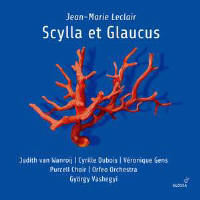Texte paru dans: / Appeared in: |
|
|
Outil de traduction |
|
|
Leclair’s only commission from the Paris Opéra was a box-office flop, never revived on the public stage until modern times. Its first recording, by the English Baroque Soloists (Erato, 4/88), was made in association with Opéra de Lyon – the composer’s native city. Otherwise, the work received scant attention until undergoing a renaissance over the past decade. Compelling accounts by Les Nouveaux Caractères (Alpha, 2/16) and Il Giardino d’Amore (Château de Versailles Spectacles, 12/22) are followed now by an accomplished interpretation by György Vashegyi’s Budapest forces. Another of their prolific high-quality collaborations with industrious musicologists at the Centre de Musique Baroque de Versailles, this fresh look at the sources adopts various cuts and alterations made during the original 1746 run of performances.
The Orfeo Orchestra play the Overture and assorted dances suavely. In the prologue, worshippers at the temple of Venus in the ancient Cypriot city of Amanthus are interrupted by the heretical Propoetides (young women who smash the goddess’s statue). To punish their impiety by turning them to stone, Venus (sung ingenuously by Hasnaa Bennani) descends during a symphony that juxtaposes regal trumpets, lyrical flutes and svelte strings.
The main drama, based on Ovid’s Metamorphoses, begins with the nymph Scylla’s reluctance to commit to loving the shepherd Glaucus; Judith van Wanroij’s eloquent vulnerability is matched aptly by whispering flutes. A divertissement for shepherds, shepherdesses, sylvans and dryads is judged sensuously, including a few concise Musettes featuring an actual musette played piquantly by Clément Lefèvre. The stylised pangs of Glaucus’s unrequited love are captured touchingly by Cyrille Dubois, whose unwise solicitation of help from the dangerous Circé has wideranging dynamism. The infatuated sorceress’s dark-hued juxtaposition of fury and frailty is brought to life emphatically by Véronique Gens. The gorgeous choral passacaille ‘Amants dont le prix’ exploits every possible instrumental texture and vocal means from the assorted company in order to place the resistant Glaucus under Circé’s spell. When the enchantment is broken, the Purcell Choir switch with admirable flexibility to menacing calls for revenge in the lively climax to Act 2.
Van Wanroij, unison flutes and moody strings blend impeccably in Scylla’s secretive admission of love. Her love duet with Dubois’s tender Glaucus is a brief moment of unimpeded bliss – it is a pity that his recitative response and airy love song (a cue for an affectionate divertissement for the Divinities of the Sea) are split across the two discs. An exquisite chorus that invokes the blessings of Cupid is rudely disturbed by a storm cloud carrying the wrathful Circé – whose lastditch attempt to seduce Glaucus in the ariette ‘Reviens, ingrat mais cher amant’ has an intimate solo trio of flute, violin and harpsichord. Circé feigns mercy for the departing lovers before summoning demons (as Mount Etna spews out flames) in a malevolent ombra scene that is performed enthrallingly by Gens, a chorus of infernal spirits, David Witczak’s menacing Hécate and the orchestra’s taut tremolandos. The bulk of Act 5 portrays the serene joy of the lovers in their tender duet, Glaucus’s flamboyant ariette ‘Chantez l’Amour’ (showcasing Dubois’s attractive phrasing and agile upper register) and a divertissement of Sicilians (Jehanne Amzal’s lovely solo verses accompanied by ingeniously shifting orchestrations). As soon as Scylla looks into a poisoned fountain, the performers walk along a tightrope of refinement and momentum as the drama hurtles towards tragedy. Circé gloats that she has transformed the drowned Scylla’s corpse into a rock surrounded by sea monsters – revealed in the whirling final symphony replete with crashing sound effects. |
|




